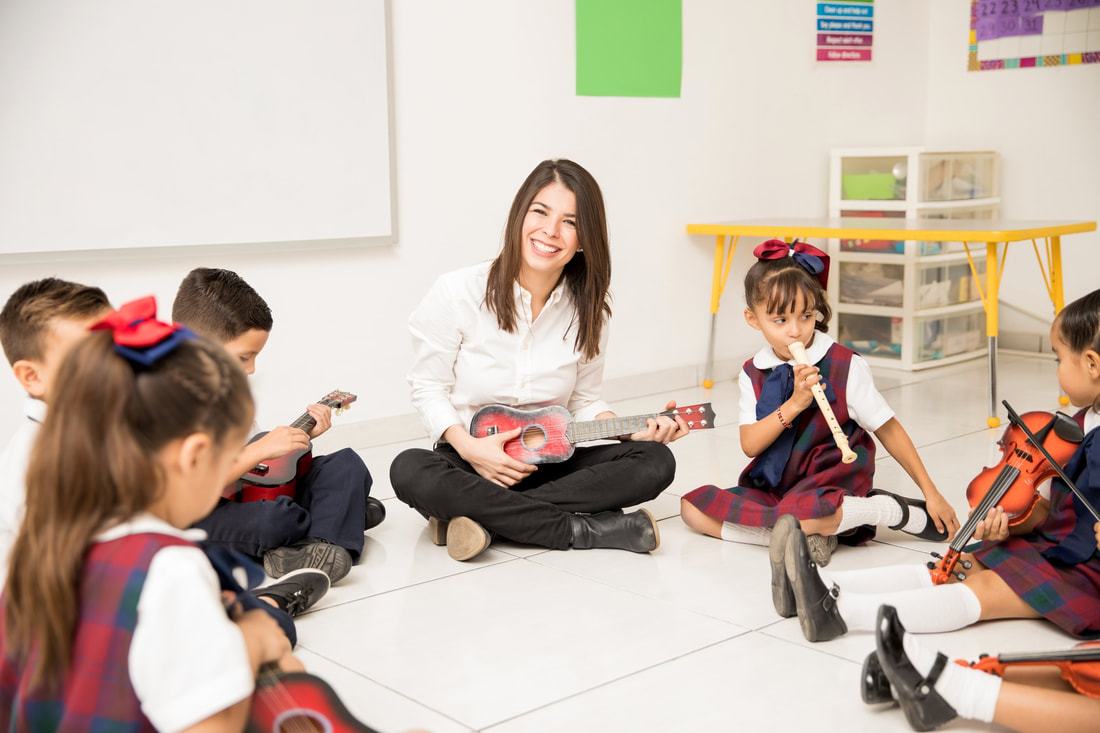|
For many years, educators have stressed the importance of music education for childhood development. Numerous studies have been done over the years to prove the connection between social emotional, intellectual, and motor skill development in children who are exposed to music in early childhood. This article examines the benefits music education offers for early childhood development.
The Social Aspect of Music: Building Social Skills in Children Music is often a group activity, especially in the elementary classroom. This fosters children to learn to work together as a group and build social skills which benefit them in their every day lives. A recent study on the positive effects of music on the emotions of 3- to 12-year-old children published in the National Library of Medicine showed that children who were exposed to music had greater emotional intelligence, academic performance, and prosocial skills (Blascko-Magraner). Another study by Sabahat Burak examining the effects of music education on 3rd graders showed there was a significant difference between the control group and the experimental group which received social skills through musical play. The group that received musical education after 10-weeks was more likely to make eye contact, say "hello," say "thank you," and complete other social activities which were observed during the experiment. As a music teacher, I've seen the effects of music on the development of children repeatedly in the classroom. It is comforting to know there is evidence that supports music education in schools. The Intellectual Impact of Music on Children Studies have shown that exposure to music from an early age can improve language development, spatial-temporal reasoning, and mathematical skills. The Mozart Effect was a controversial study done in 1993. Rauscher claimed that Mozart's sonata K448 for two pianos helped people have better spatial reasoning skills after listening for ten minutes. Many people attempted to repeat his experiment with mixed findings. One interesting finding was that listening to Mozart's piano sonata helped reduce epilepti-form activity in people with epilepsy. Studies have found that listening to music activates a wide area of the brain. Because music has so many qualities which we understand through listening, such as rhythm, pitch, meter, timbre, and emotion, it ignites different parts of the brain (Jenkins). After five decades of research, a study by Dr. Ayca Akin concluded that incorporating music into math lessons significantly enhances children's mathematical abilities (Information). There were several uses of music relating to math which helped students perform better: Students who learned musical instruments, music integrated into the math lessons themselves to help teach math, and students who used music to alleviate math-related anxiety. Music Education Enhances Motor Skills in Children Dance is often incorporated into early childhood music education in schools. This has been shown to help develop coordination, balance, and fine motor skills. Also, learning about and performing rhythm in music strengthens these connections in the brain. In the article "Music Making as a Tool for Promoting Brain Plasticity across the Life Span" Wan and Schlaug explain their research has shown "music making can be an interactive treatment or intervention for neurological and developmental disorders, as well as those associated with normal aging." Reading music notation while playing an instrument or tapping a rhythm on a drum may positively affect children learn new motor skills. Music to Influence Emotional Well-being in the Classroom Music has been called the "universal language" due to its power to convey emotion despite language and cultural barriers. Listening to music produces endorphins, modulates moods, and reduces stress. These effects have a positive impact on psychological well-being and self-confidence. A study performed on 100 Nigerian college students found that musical interventions such as singing songs, analyzing librettos, designing musical instruments, playing pianos and handbells, creating artwork, and writing songs led to less aggressive behavior overall. Their aggressive behavior had included teasing, threatening, and starting fights with other students. They used percussion instruments to express their anger and a significant decrease in aggression was observed. In conclusion, music plays a very important role for early childhood development. The act of performing and listening to music helps social emotional, intellectual, and motor skill development. It should be a priority for schools to maintain their music programs. References Blasco-Magraner, Jose Salvador, Bernabe-Valero, Gloria, Marin-Liebana, Pablo, and Moret-Tatay, Carmen. https://www.ncbi.nlm.nih.gov/pmc/articles/PMC8037606/ "Effects of the Educational Use of Music on 3- to 12-Year-Old Children's Emotional Development: A Systematic Review." (April 1, 2021) Accessed 5-12-2024 Burak, Sabahat. "The Effect of Musical Play on the Social Skill Development of Primary School Students." (November 29, 2023) https://files.eric.ed.gov/fulltext/EJ1416190.pdf (Accessed 5-12-2024) Jenkins, JS. "The Mozart Effect" April 2001 p170-172. Journal of the Royal Society of Medicine. https://www.ncbi.nlm.nih.gov/pmc/articles/PMC1281386/ (Accessed 5-12-2024) Information. "The Powerful Connection: How Combining Maths With Music Can Improve Students' Scores." https://www.helsinkitimes.fi/176-information/study/23819-the-powerful-connection-how-combining-maths-with-music-can-improve-students-scores.html June 29, 2023. (Accessed 5-12-2024) Wan, Catherine Y. and Schlaug, Gottfried. "Music Making as a Tool for Promoting Brain Plasticity Across the Life Span." https://journals.sagepub.com/doi/10.1177/1073858410377805 October 1, 2010. (Accessed 5-12-2024) Nwokenna, Edith N., Sewagegn, Abatihun Alehegn, and Falade, Temitope Ayodeji. "Effect of Educational Music Invervention on College Students' Aggressive Behavior." January 6, 2023. https://www.ncbi.nlm.nih.gov/pmc/articles/PMC9829255/#:~:text=Results%3A,counterparts%20in%20the%20control%20group. (Accessed 5-12-2024)
0 Comments
Leave a Reply. |
�
Angela BondMusic Teacher/ Musician/ Owner of Plum Rose Publishing Categories |
We improve our products and advertising by using Microsoft Clarity to see how you use our website. By using our site, you agree that we and Microsoft can collect and use this data. Our privacy statement <link> has more details.
We Use PayPal: PayPal accepts Debit or Credit Card
Price pls tax and shipping and handling
We Use PayPal: PayPal accepts Debit or Credit Card
Price pls tax and shipping and handling
company id 100



